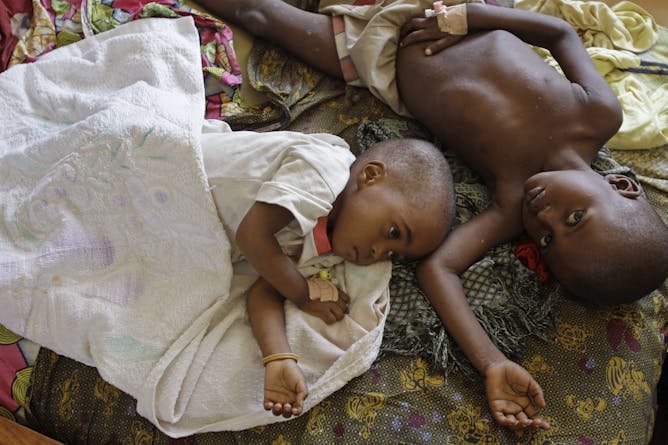Chances are you’ll live much longer than your ancestors thanks to a treatment developed by a drug company. Unfortunately, not everyone benefits equally. That’s because there is no guarantee curing a deadly ailment that primarily afflicts poorer patients – such as dengue fever and malaria – will pay off for the drugmaker.
This puts us all at risk, argues James Leahy, a chemistry professor at the University of South Florida. The good news is that nonprofit ventures are starting to fill this gap, and their efforts “could prove paramount to the survival of the human species,” he explains.
Also today:
Top story
|

Millions of young children get malaria. These two got it in 2010.
AP Photo/Schalk van Zuydam
James Leahy, University of South Florida
There's a big market for new treatments for TB, malaria and other ailments. But most of these diseases afflict low-income people unable to pay for medicine.
|
Politics + Society
|
-
Monti Datta, University of Richmond
Most of the world might hate Trump, but in some places, based largely on his policies, there is hope and even admiration.
-
Samantha McDonald, University of California, Irvine
Advancements in computer technology are changing how Congress handles citizen communication, which affects how elected officials represent their constituents.
|
|
|
|
Economy + Business
|
-
Daniel Wirls, University of California, Santa Cruz
Sen. Warren said the filibuster stands in the way of gun reform. It does, and so much more.
-
Lindsey Simon, University of Georgia
A bankruptcy filing always means there's not enough money to go around, but the process ensures both debtors and creditors are protected.
|
|
|
|
|
|
Most read on site
|
-
Christye Sisson, Rochester Institute of Technology
A key element of the battle between truth and propaganda has nothing to do with technology. It has to do with how people are much more likely to accept something if it confirms their beliefs.
-
Kent Willis, University of Tennessee
Fungi live in everyone's gut – but now a new study reveals that this colonization may begin before birth.
-
Kenneth A. Kiewra, University of Nebraska-Lincoln
Looking to earn good grades? Good notes could help, an expert says.
|
|
Today’s chart |
-
  |
Samantha McDonald
University of California, Irvine
|
| |
| |
|
|
| |
|
|